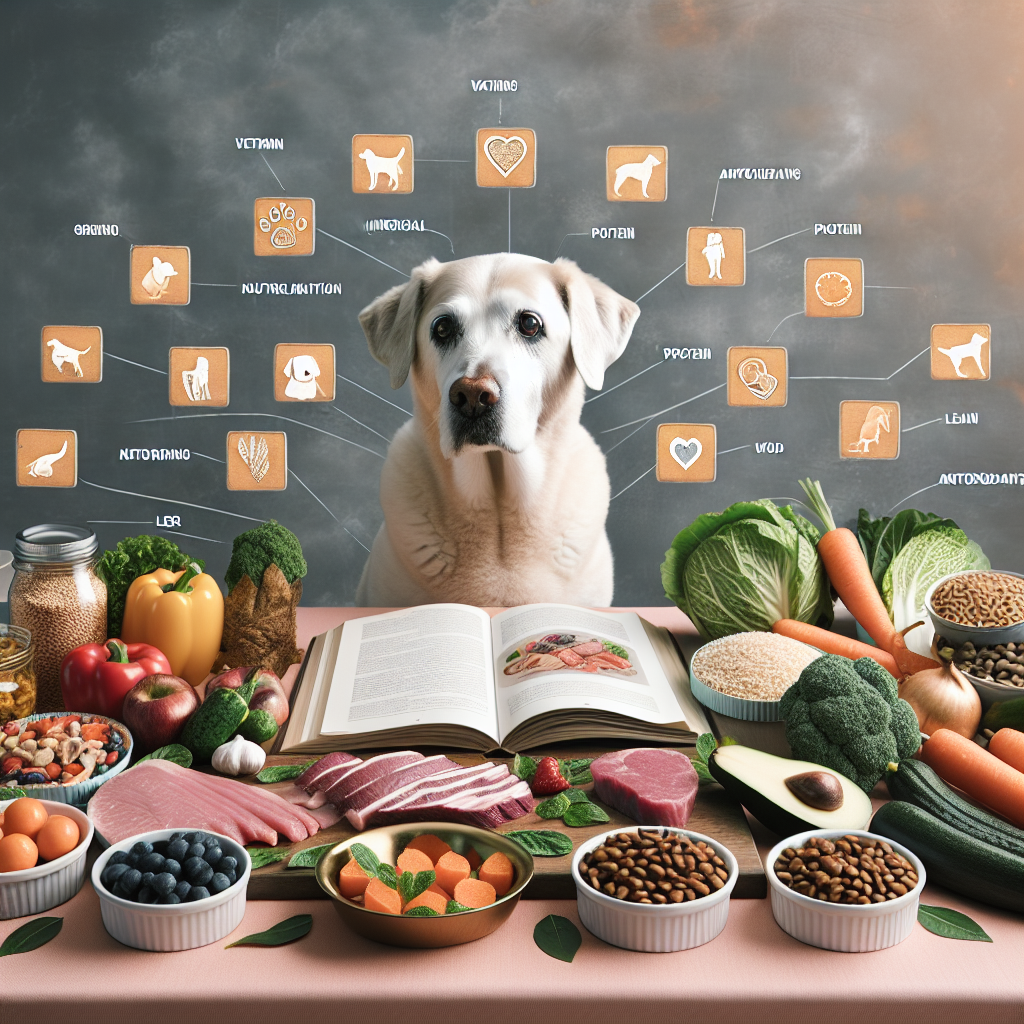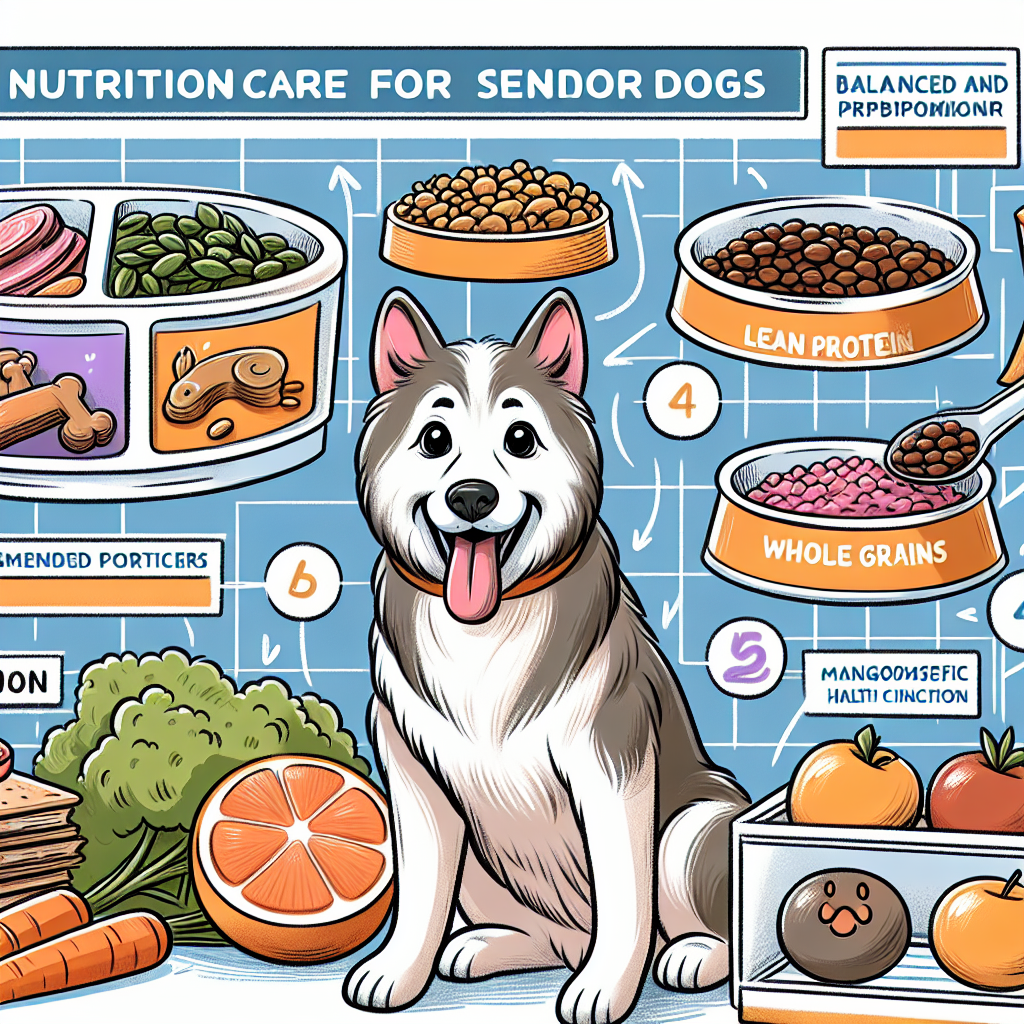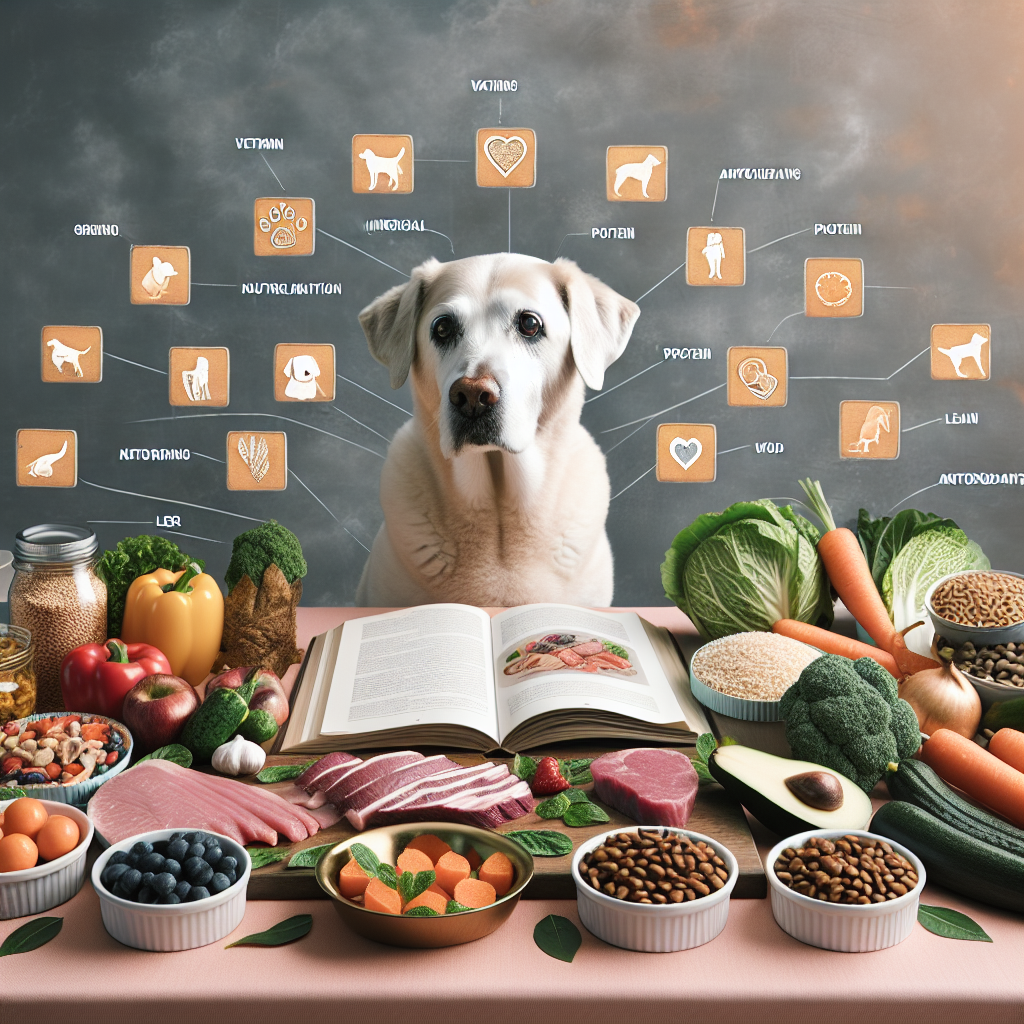As your beloved furry friend gets older, it’s important to ensure they are receiving the right nutrition to support their changing needs. In this article, we will provide an in-depth and comprehensive nutrition guide specifically designed for senior dogs. From understanding the key nutrients they require to maintaining a healthy weight and promoting joint health, this guide will equip you with all the necessary information to provide optimal nutrition for your aging companion. Let’s embark on this journey together and ensure your senior dog leads a healthy and happy life.
Importance of Proper Nutrition for Senior Dogs
As your beloved furry friend enters their golden years, it becomes even more crucial to provide them with proper nutrition. Just like humans, senior dogs experience changes in their bodies as they age. These changes can affect their metabolism, activity levels, and overall health. By understanding the aging process and the essential nutrients that senior dogs need, you can ensure that your furry companion stays healthy and happy in their senior years.
1. Understanding the Aging Process
1.1 Changes in Metabolism
As dogs age, their metabolism naturally slows down. This means that they require fewer calories to maintain their weight. Feeding them the same amount of food as when they were younger can lead to weight gain and potential health issues. It’s important to adjust their caloric intake accordingly to prevent obesity and the associated risks.
1.2 Decreased Activity Levels
Another aspect of the aging process is a decrease in activity levels. Senior dogs tend to have less energy and may not engage in as much exercise or playtime as they used to. This reduction in physical activity affects their caloric needs and nutrient requirements. Providing them with a balanced diet that meets their energy requirements while not overfeeding is essential for their overall health.
1.3 Dental Health Issues
As dogs age, they may develop dental health issues such as tooth decay, gum disease, and tooth loss. These issues can make it difficult for them to chew hard kibble or certain types of food. Ensuring that their diet includes options that are easy to chew and digest can help prevent further dental problems and ensure that they can enjoy their meals without discomfort.
2. Essential Nutrients for Senior Dogs
To support the aging process and maintain their health and vitality, senior dogs require specific nutrients in their diet. Here are some essential nutrients that should be included in their meals:
2.1 Protein
Protein is essential for senior dogs as it helps to maintain muscle mass and supports various bodily functions. High-quality protein sources such as lean meats, fish, poultry, and eggs should be included in their diet. Aim for a protein content of around 25-30% in their food.
2.2 Fat
Healthy fats are a valuable source of energy for senior dogs. They also play a crucial role in maintaining healthy skin and coat, supporting organ function, and aiding nutrient absorption. Look for dog food that contains moderate levels of healthy fats such as omega-3 and omega-6 fatty acids.
2.3 Carbohydrates
Carbohydrates provide a source of energy for senior dogs, but it’s important to choose complex carbohydrates that are easily digestible and provide steady energy throughout the day. Whole grains like brown rice and sweet potatoes are good options for senior dogs.
2.4 Vitamins and Minerals
Senior dogs require an appropriate balance of vitamins and minerals to support their overall health. Look for dog food that includes essential vitamins like A, B, D, and E, as well as minerals like calcium, phosphorus, and zinc.
2.5 Water
Water is crucial for dogs of all ages, but it becomes even more important for senior dogs. Proper hydration is vital for the function of organs, digestion, and overall bodily health. Ensure that your senior dog always has access to fresh, clean water, and monitor their water intake to prevent dehydration.

3. Determining the Right Caloric Intake
Determining the right caloric intake for your senior dog is essential to maintain a healthy weight and support their overall well-being. Here are some factors to consider:
3.1 Body Condition Score
Assessing your dog’s body condition score can help determine if they are at a healthy weight. Consult with your veterinarian to learn how to assess their body condition and make adjustments to their diet accordingly.
3.2 Consultation with Veterinarian
It’s always a good idea to consult with your veterinarian when determining the appropriate caloric intake for your senior dog. They can consider factors such as breed, age, activity level, and overall health to provide personalized recommendations.
3.3 Adjusting for Individual Needs
Every dog is different, and individual needs may vary. Keep an eye on your senior dog’s weight and overall health, and make adjustments to their caloric intake as needed. Regular monitoring can help ensure they are receiving the right amount of food for their specific needs.
4. Choosing the Right Senior Dog Food
When it comes to choosing the right food for your senior dog, there are a few factors to consider.
4.1 How to Read Labels
Take the time to read and understand the labels on dog food products. Look for specific information such as the quality of ingredients, nutritional content, and recommended feeding guidelines. Understanding the information on the labels can help you make an informed decision.
4.2 Identifying Quality Ingredients
Opt for dog food that lists high-quality ingredients at the top of the ingredient list. Avoid products that contain fillers, artificial additives, or low-quality protein sources. Look for real meat or fish as the main ingredient, as this provides essential nutrients for your senior dog.
4.3 Wet vs. Dry Food
Both wet and dry food can be suitable options for senior dogs, and it often comes down to personal preference. Wet food can provide additional hydration and is easier to chew for dogs with dental issues. Dry food, on the other hand, can help maintain dental health by promoting chewing and reducing tartar buildup. Consider your dog’s specific needs and consult with your veterinarian to determine the best option.
4.4 Homemade Diet vs. Commercial Food
Some pet owners may opt to prepare homemade meals for their senior dogs. While this can be done with proper guidance and knowledge of canine nutrition, it’s crucial to ensure that the homemade diet provides all the necessary nutrients in the correct proportions. Consult with a veterinary nutritionist to create a balanced homemade diet if you choose this route. Alternatively, commercial dog food that is specifically formulated for senior dogs can provide a convenient and nutritionally balanced option.

5. Special Considerations for Health Conditions
Senior dogs may have specific health conditions that require special attention when it comes to their diet. Here are some considerations for common health issues:
5.1 Arthritis and Joint Health
Arthritis is common among senior dogs, and a diet that supports joint health can help alleviate symptoms. Look for dog food that includes ingredients such as glucosamine and chondroitin, which promote joint health and reduce inflammation.
5.2 Dental Issues
If your senior dog has dental issues, consider food options that are specially designed for dental health. These can include kibble with a larger size or special texture that helps remove plaque and tartar from their teeth.
5.3 Kidney Disease
Kidney disease is a common health issue in senior dogs. A diet that is low in phosphorus and high in quality proteins can help support kidney function and slow down the progression of the disease. Consult with your veterinarian for specific dietary recommendations for dogs with kidney disease.
5.4 Heart Conditions
Certain heart conditions may require dietary modifications to manage symptoms and promote heart health. Look for dog food that is low in sodium and contains heart-healthy ingredients such as omega-3 fatty acids.
5.5 Allergies and Food Sensitivities
Senior dogs may develop allergies or food sensitivities later in life. If your dog experiences digestive issues or allergic reactions, consider switching to a limited ingredient diet or a hypoallergenic food option. These diets usually contain novel protein sources and exclude common allergens.
6. Supplements for Senior Dogs
Supplements can play a beneficial role in supporting the health and well-being of senior dogs. Here are some commonly recommended supplements:
6.1 Glucosamine and Chondroitin
Glucosamine and chondroitin are commonly used to support joint health and alleviate symptoms of arthritis in senior dogs. These supplements can help improve mobility and reduce inflammation.
6.2 Omega-3 Fatty Acids
Omega-3 fatty acids, such as those found in fish oil, are beneficial for overall health, including skin and coat health, joint health, and cognitive function. Adding omega-3 supplements to your senior dog’s diet can provide these important nutrients.
6.3 Antioxidants
Antioxidants, such as vitamin C and E, are known for their ability to combat the effects of aging and support overall health. Senior dogs can benefit from supplements that contain antioxidants to promote vitality and protect against oxidative stress.
6.4 Probiotics
Probiotics are beneficial bacteria that support digestive health and immune function. Aging can affect the balance of good bacteria in the gut, and adding a probiotic supplement to your senior dog’s diet can help maintain a healthy digestive system.
7. Feeding Schedule and Portions
Establishing a feeding schedule and controlling portion sizes is important for senior dogs. Here are some factors to consider:
7.1 Number of Meals per Day
Senior dogs may benefit from having smaller, more frequent meals throughout the day. This can help with digestion and prevent discomfort from overeating. Consult with your veterinarian to determine the appropriate number of meals for your senior dog.
7.2 Portion Control
Controlling portion sizes is crucial to prevent weight gain or obesity in senior dogs. Follow the recommended feeding guidelines provided by the manufacturer of your dog’s food, and adjust portions as necessary based on your dog’s individual needs and body condition.
7.3 Monitoring Weight
Regularly monitoring your senior dog’s weight is important to ensure they are maintaining a healthy weight. If you notice any significant weight fluctuations, consult with your veterinarian to make appropriate adjustments to their diet.
8. Transitioning to a New Diet
When transitioning your senior dog to a new diet, it’s important to do so gradually to prevent digestive upset. Here are some tips for a smooth transition:
8.1 Gradual Transition
Start by mixing a small amount of the new food with their current food and gradually increase the proportion of the new food over several days or weeks. This allows their digestive system to adjust to the change without causing any discomfort.
8.2 Monitoring Digestive Health
During the transition period, keep an eye on your senior dog’s digestive health. If you notice any signs of digestive upset such as diarrhea or vomiting, consult with your veterinarian for guidance.
10. Regular Veterinary Check-ups
Regular veterinary check-ups are crucial for the overall health and well-being of senior dogs. Here’s why:
10.1 Importance of Regular Check-ups
Senior dogs are more prone to age-related health issues, and regular check-ups can help detect any potential problems early on. Your veterinarian can assess their overall health, monitor weight and body condition, and make any necessary adjustments to their diet or medical care.
10.2 Blood Tests and Senior Dog Health Monitoring
Blood tests are often recommended for senior dogs to monitor organ function, check for any underlying health issues, and ensure that their diet is adequately supporting their specific needs. These tests can provide valuable insights into your dog’s health and help guide any necessary dietary adjustments.
By understanding the importance of proper nutrition for senior dogs and taking the necessary steps to meet their specific needs, you can help ensure that your furry companion enjoys a happy and healthy life well into their senior years. Remember to consult with your veterinarian for personalized advice and recommendations tailored to your dog’s unique needs and health status. With the right nutrition and care, your senior dog can continue to bring joy and companionship for many years to come.

